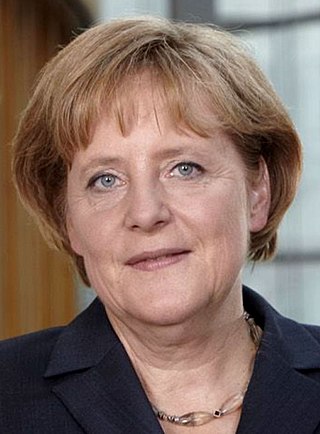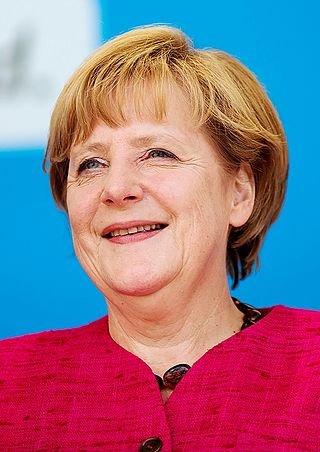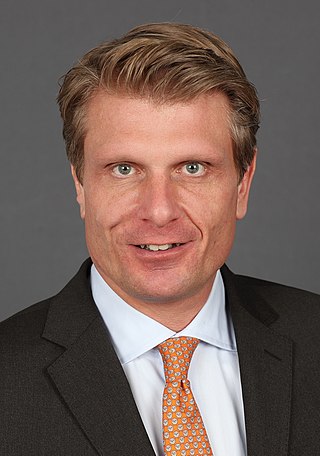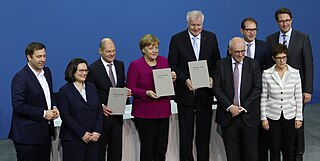
Germany is a democratic and federal parliamentary republic, where federal legislative power is vested in the Bundestag and the Bundesrat.

The Christian Democratic Union of Germany is a Christian democratic and conservative political party in Germany. It is the major party of the centre-right in German politics.

Martin Schulz is a German politician who was a Member of the European Parliament (MEP) from Germany from 1994 to 2017 and a Member of the Bundestag (MdB) from 2017 to 2021. During his tenure he was Leader of the Progressive Alliance of Socialists and Democrats from 2004 to 2012, President of the European Parliament from 2012 to 2017 and Leader of the Social Democratic Party from 2017 to 2018.

Federal elections were held in Germany on 27 September 2009 to elect the members of the 17th Bundestag.

The First Merkel cabinet was the Government of the Federal Republic of Germany from 22 November 2005 to 27 October 2009 throughout the 16th legislative session of the Bundestag. Led by Christian Democrat Angela Merkel, the first female Chancellor in German history, the cabinet was supported by a grand coalition between the Christian Democratic Union (CDU), Christian Social Union of Bavaria (CSU) and the Social Democratic Party (SPD).

CDU/CSU, unofficially the Union parties or the Union, is a centre-right Christian democratic and conservative political alliance of two political parties in Germany: the Christian Democratic Union of Germany (CDU) and the Christian Social Union in Bavaria (CSU).

Federal elections were held on 22 September to elect the members of the 18th Bundestag of Germany. At stake were all 598 seats to the Bundestag, plus 33 overhang seats determined thereafter. The Christian Democratic Union of Germany/Christian Social Union of Bavaria (CDU/CSU) of incumbent chancellor Angela Merkel won their best result since 1990 with nearly 42% of the vote and nearly 50% of the seats, just five short for an overall majority. The Free Democratic Party (FDP) failed to meet the 5% vote electoral threshold in what was their worst showing ever in a federal election, denying them seats in the Bundestag for the first time in their history.
Grand coalition is a nickname in German politics describing a governing coalition of the parties Christian Democratic Union (CDU) along with its sister party the Christian Social Union of Bavaria (CSU) and the Social Democratic Party (SPD), since they have historically been the major parties in most state and federal elections since 1949. The meaning of the term may change due to the growth of some formerly minor parties in recent years.

Thomas Bareiß is a German politician of the Christian Democratic Union (CDU) who has been serving as a member of the German Bundestag since 2005. From 2018 to 2021, he held the position of Parliamentary State Secretary at the Federal Ministry of Economic Affairs and Energy in Chancellor Angela Merkel's cabinet.

Christian Freiherr von Stetten is a Swiss-German businessman and politician of the Christian Democratic Union of Germany (CDU). He has served as Member of the Parliament of Germany, the Bundestag, since 2002. He represents the constituency of Schwäbisch Hall-Hohenlohe, and succeeded his father Wolfgang von Stetten as the Member of Parliament from that constituency.
This is a list of opinion polling results for the 2013 German federal election, held on 22 September 2013.

Jens Georg Spahn is a German politician who served as Federal Minister of Health in the fourth cabinet of Chancellor Angela Merkel from 2018 to 2021. A member of the centre-right Christian Democratic Union (CDU), he has been the member of the lower house of the federal parliament, the Bundestag, for Steinfurt I – Borken I since 2002.

Federal elections were held in Germany on 24 September 2017 to elect the members of the 19th Bundestag. At stake were at least 598 seats in the Bundestag, as well as 111 overhang and leveling seats determined thereafter.

The Third Merkel cabinet was the 23rd Government of the Federal Republic of Germany during the 18th legislative session of the Bundestag. Installed after the 2013 federal election, it left office on 14 March 2018. It was preceded by the second Merkel cabinet and succeeded by the fourth Merkel cabinet. Led by Chancellor Angela Merkel. The government was supported by a coalition of the Christian Democratic Union (CDU), the Christian Social Union of Bavaria (CSU) and the Social Democrats (SPD). Sigmar Gabriel (SPD) replaced Philipp Rösler (FDP) as Vice Chancellor of Germany and became Federal Minister for Economics and Energy.

The 2016 Mecklenburg-Vorpommern state election was held on 4 September 2016 to elect the members of the 7th Landtag of Mecklenburg-Vorpommern. The incumbent grand coalition between the Social Democratic Party (SPD) and Christian Democratic Union (CDU) led by Minister-President Erwin Sellering retained its majority and continued in office.

Federal elections were held in Germany on 26 September 2021 to elect the members of the 20th Bundestag. State elections in Berlin and Mecklenburg-Vorpommern were also held. Incumbent chancellor Angela Merkel, first elected in 2005, chose not to run again, marking the first time that an incumbent Chancellor of the Federal Republic of Germany did not seek re-election.

The Fourth Merkel cabinet was the 23rd Government of the Federal Republic of Germany during the 19th legislative session of the Bundestag. It was sworn in on 14 March 2018 following the 2017 federal election and dismissed on 26 October 2021, acting in a caretaker mode until 8 December 2021. It was preceded by the third Merkel cabinet and succeeded by the Scholz cabinet. Led by Chancellor Angela Merkel, it was the third cabinet under Merkel to be supported by a coalition of the Christian Democratic Union (CDU), the Christian Social Union of Bavaria (CSU), and the Social Democratic Party (SPD).

The 2018 Hessian state election was held on 28 October 2018 to elect the members of the Landtag of Hesse. The outgoing government was a coalition of the Christian Democratic Union (CDU) and The Greens led by Minister-President Volker Bouffier.
The 2018 German government crisis, sometimes referred to as Asylstreit, was a government crisis affecting the Fourth Merkel cabinet, which began on 18 June 2018 and effectively ended on 4 July 2018.

Thomas Silberhorn is a German lawyer and politician of the Christian Social Union (CSU) who has been serving as a member of the Bundestag from the state of Bavaria since 2002.
















